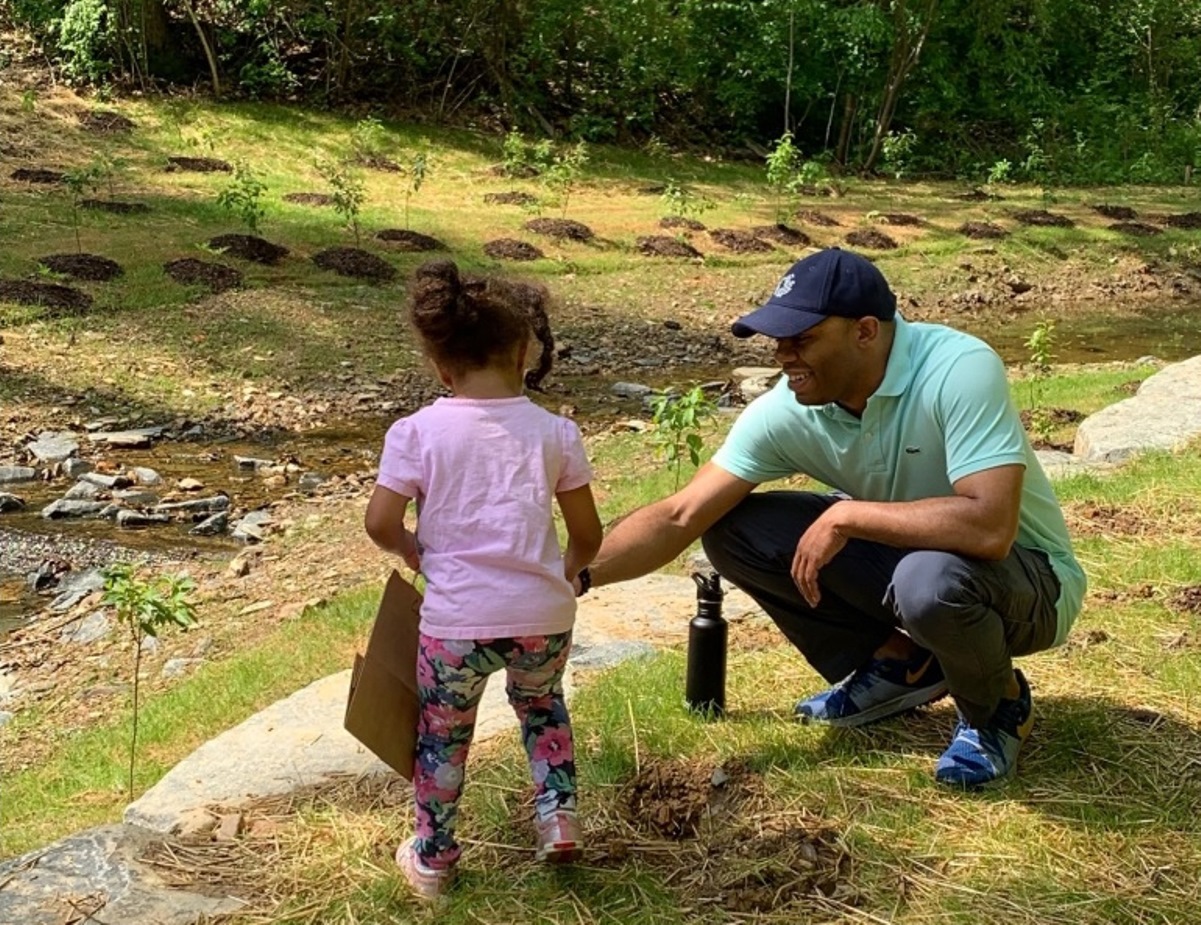This week Rep. Nanette Diaz Barragán (D-CA) and Rep. Mike Turner (R-OH) reintroduced the Outdoors for All Act (HR4512), previously known as the Outdoor Recreation Legacy Partnership Act. This legislation is aimed at creating more equitable access to the outdoors and is a companion bill to legislation introduced in May by Senator Kamala D. Harris (D-CA). Outdoors for All would codify and establish a dedicated funding source for the Outdoor Recreation Legacy Partnership program (ORLP). Funded through the Land and Water Conservation Fund (LWCF), ORLP provides matching grants to create and improve state and locally owned parks and outdoor recreation areas, particularly in communities lacking quality recreation access and thereby deprived of the many benefits that parks and open spaces provide.
ORLP has funded over 30 projects across the country, including the transformation of a degraded urban stormwater conveyance into a community asset that will connect diverse neighborhoods and provide new recreation opportunities for predominantly low-income families in Mobile, Alabama. Another great example of an ORLP project is the development of a multiuse loop trail providing access to natural ecosystems, wildlife observation and educational opportunities in Detroit.
Though focused on one specific federal grant program, the reintroduction of the Outdoors for All Act also broadly elevates the importance of equity in the outdoors. We are engaged in a national conversation about the importance of access to nature for social, mental, and physical health. Outdoors for All will help to ensure that a direct connection to nature is available to all, not just those who live in certain neighborhoods or who come from privileged socioeconomic backgrounds.
As Senator Harris said when she announced the bill, “Every American—especially our children—deserves access to the outdoors no matter where they live. We must do more to ensure that our communities have conveniently located parks and open spaces so that everybody can enjoy the mental and physical health benefits of spending time outdoors.”
Many barriers keep low-income families and communities of color from having access to the outdoors. Our neighborhoods and schools are increasingly segregated by both race and class in the US, meaning that people of color and low-income families are less likely to live near a local park. On top of that, there are issues related to safe and affordable transportation, the burden of expensive gear needed to participate in certain activities, cost-prohibitive after-school programming and summer camp opportunities for youth, and much more.
I recently spoke with Roberto Morales regarding the importance of nearby access to nature. “We have a lot of youth in the city of Los Angeles that don’t have adequate access to nearby open space and our communities are suffering from high rates of childhood asthma and diabetes. Having nearby open space where children can play and families can safely recreate is specially needed in communities of color where there are also air and water quality issues. Local nearby open space is also extremely important to connecting people to our public lands and to our national parks since they are usually the first connections people make to wildlife and to native plants. If we desire to increase the diversity in our national parks and make them feel more welcome for people of color we should start by focusing on engaging folks where they are at.”
Many of these problems come down to a lack of resources, inclusive engagement, and effective planning when it comes to deciding how we invest in the development of our schools, neighborhoods, and larger communities. The Outdoors for All Act is an important first step in prioritizing the development of parks and outdoor spaces as part of creating healthier, vibrant, and sustainable communities.
Beyond increased and targeted funding, the issues of relevance, representation, and inclusivity are critical when it comes to equity in the outdoors. Our country’s long history of racism and exclusion, which often manifests itself in current events, prevents many people of color from feeling welcomed or safe outdoors. For example, the origin story of our national parks, often considered “America’s best idea,” includes the near-genocide and forced removal of Native peoples from their lands to ultimately create natural playgrounds for white and wealthy Americans. During the Jim Crow era, our national parks were racially segregated, with only the lowest-quality facilities made available to African Americans.
Today, the legacy of racism and exclusion lives on, and a lack of diversity among park rangers and visitors to our national parks and public lands makes for a less-than-welcoming environment for the majority of people who identify beyond socially constructed norms centered on racist, classist, and patriarchal perspectives. Along with the rest of our institutions, policies, and culture, we must decolonize the outdoor experience.
On the same day that Senator Harris reintroduced the Outdoors for All Act, Sierra Club Outdoors officially changed its name to Sierra Club’s Outdoors for All campaign. Through Outdoors for All, we are committed to addressing the many barriers that stand between where we our now and our vision for a just, equitable, and sustainable future where all people benefit from a healthy, thriving planet and a direct connection to nature. Through advocating for public policy solutions, direct and indirect programming to connect people with the outdoors, and leveraging partnerships at the national, regional, and community-based scale, The Sierra Club’s Outdoors for All campaign is working to ensure everyone has the opportunity to develop their own unique and meaningful relationship to nature. In doing so we hope to build a robust 21st-century environmental movement that connects more people to the outdoors and fosters transformational experiences inspiring a new generation of leaders.
Join us to pass the Outdoors for All Act today.
